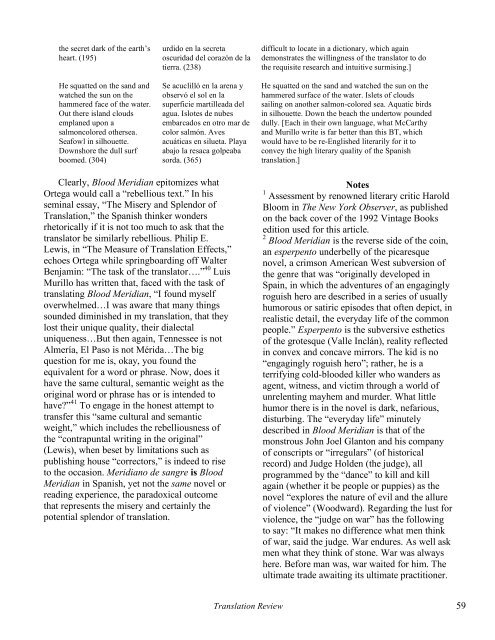Translation Review - The University of Texas at Dallas
Translation Review - The University of Texas at Dallas
Translation Review - The University of Texas at Dallas
You also want an ePaper? Increase the reach of your titles
YUMPU automatically turns print PDFs into web optimized ePapers that Google loves.
the secret dark <strong>of</strong> the earth’s<br />
heart. (195)<br />
He squ<strong>at</strong>ted on the sand and<br />
w<strong>at</strong>ched the sun on the<br />
hammered face <strong>of</strong> the w<strong>at</strong>er.<br />
Out there island clouds<br />
emplaned upon a<br />
salmoncolored othersea.<br />
Seafowl in silhouette.<br />
Downshore the dull surf<br />
boomed. (304)<br />
urdido en la secreta<br />
oscuridad del corazón de la<br />
tierra. (238)<br />
Se acuclilló en la arena y<br />
observó el sol en la<br />
superficie martilleada del<br />
agua. Islotes de nubes<br />
embarcados en otro mar de<br />
color salmón. Aves<br />
acuáticas en silueta. Playa<br />
abajo la resaca golpeaba<br />
sorda. (365)<br />
difficult to loc<strong>at</strong>e in a dictionary, which again<br />
demonstr<strong>at</strong>es the willingness <strong>of</strong> the transl<strong>at</strong>or to do<br />
the requisite research and intuitive surmising.]<br />
He squ<strong>at</strong>ted on the sand and w<strong>at</strong>ched the sun on the<br />
hammered surface <strong>of</strong> the w<strong>at</strong>er. Islets <strong>of</strong> clouds<br />
sailing on another salmon-colored sea. Aqu<strong>at</strong>ic birds<br />
in silhouette. Down the beach the undertow pounded<br />
dully. [Each in their own language, wh<strong>at</strong> McCarthy<br />
and Murillo write is far better than this BT, which<br />
would have to be re-Englished literarily for it to<br />
convey the high literary quality <strong>of</strong> the Spanish<br />
transl<strong>at</strong>ion.]<br />
Clearly, Blood Meridian epitomizes wh<strong>at</strong><br />
Ortega would call a “rebellious text.” In his<br />
seminal essay, “<strong>The</strong> Misery and Splendor <strong>of</strong><br />
<strong>Transl<strong>at</strong>ion</strong>,” the Spanish thinker wonders<br />
rhetorically if it is not too much to ask th<strong>at</strong> the<br />
transl<strong>at</strong>or be similarly rebellious. Philip E.<br />
Lewis, in “<strong>The</strong> Measure <strong>of</strong> <strong>Transl<strong>at</strong>ion</strong> Effects,”<br />
echoes Ortega while springboarding <strong>of</strong>f Walter<br />
Benjamin: “<strong>The</strong> task <strong>of</strong> the transl<strong>at</strong>or….” 40 Luis<br />
Murillo has written th<strong>at</strong>, faced with the task <strong>of</strong><br />
transl<strong>at</strong>ing Blood Meridian, “I found myself<br />
overwhelmed…I was aware th<strong>at</strong> many things<br />
sounded diminished in my transl<strong>at</strong>ion, th<strong>at</strong> they<br />
lost their unique quality, their dialectal<br />
uniqueness…But then again, Tennessee is not<br />
Almería, El Paso is not Mérida…<strong>The</strong> big<br />
question for me is, okay, you found the<br />
equivalent for a word or phrase. Now, does it<br />
have the same cultural, semantic weight as the<br />
original word or phrase has or is intended to<br />
have?” 41 To engage in the honest <strong>at</strong>tempt to<br />
transfer this “same cultural and semantic<br />
weight,” which includes the rebelliousness <strong>of</strong><br />
the “contrapuntal writing in the original”<br />
(Lewis), when beset by limit<strong>at</strong>ions such as<br />
publishing house “correctors,” is indeed to rise<br />
to the occasion. Meridiano de sangre is Blood<br />
Meridian in Spanish, yet not the same novel or<br />
reading experience, the paradoxical outcome<br />
th<strong>at</strong> represents the misery and certainly the<br />
potential splendor <strong>of</strong> transl<strong>at</strong>ion.<br />
Notes<br />
1 Assessment by renowned literary critic Harold<br />
Bloom in <strong>The</strong> New York Observer, as published<br />
on the back cover <strong>of</strong> the 1992 Vintage Books<br />
edition used for this article.<br />
2 Blood Meridian is the reverse side <strong>of</strong> the coin,<br />
an esperpento underbelly <strong>of</strong> the picaresque<br />
novel, a crimson American West subversion <strong>of</strong><br />
the genre th<strong>at</strong> was “originally developed in<br />
Spain, in which the adventures <strong>of</strong> an engagingly<br />
roguish hero are described in a series <strong>of</strong> usually<br />
humorous or s<strong>at</strong>iric episodes th<strong>at</strong> <strong>of</strong>ten depict, in<br />
realistic detail, the everyday life <strong>of</strong> the common<br />
people.” Esperpento is the subversive esthetics<br />
<strong>of</strong> the grotesque (Valle Inclán), reality reflected<br />
in convex and concave mirrors. <strong>The</strong> kid is no<br />
“engagingly roguish hero”; r<strong>at</strong>her, he is a<br />
terrifying cold-blooded killer who wanders as<br />
agent, witness, and victim through a world <strong>of</strong><br />
unrelenting mayhem and murder. Wh<strong>at</strong> little<br />
humor there is in the novel is dark, nefarious,<br />
disturbing. <strong>The</strong> “everyday life” minutely<br />
described in Blood Meridian is th<strong>at</strong> <strong>of</strong> the<br />
monstrous John Joel Glanton and his company<br />
<strong>of</strong> conscripts or “irregulars” (<strong>of</strong> historical<br />
record) and Judge Holden (the judge), all<br />
programmed by the “dance” to kill and kill<br />
again (whether it be people or puppies) as the<br />
novel “explores the n<strong>at</strong>ure <strong>of</strong> evil and the allure<br />
<strong>of</strong> violence” (Woodward). Regarding the lust for<br />
violence, the “judge on war” has the following<br />
to say: “It makes no difference wh<strong>at</strong> men think<br />
<strong>of</strong> war, said the judge. War endures. As well ask<br />
men wh<strong>at</strong> they think <strong>of</strong> stone. War was always<br />
here. Before man was, war waited for him. <strong>The</strong><br />
ultim<strong>at</strong>e trade awaiting its ultim<strong>at</strong>e practitioner.<br />
<strong>Transl<strong>at</strong>ion</strong> <strong>Review</strong> 59

















